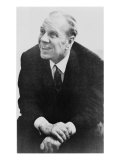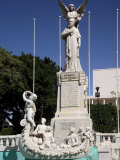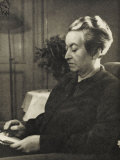|
|
|
Isabel Allende
b. 8-2-1942; Lima, Peru
Poster Text: “I was born in the back room of a shadowy house, and grew up amidst ancient furniture, books in Latin, and human mummies, but none of those things made me melancholy, because I came into the world with a breath of the jungle in my memory.” Eva Luna
Isabel Allende was a prominent 28-year-old journalist and humorist in Chile when her uncle, Salvador Allende, was elected the first socialist president in that nation's history. When his government was overthrown by General Augusto Pinochet, Allende and her family found that they were not welcome in Chile anymore, and thy moved to Venezuela. There she felt that she wanted to say something more about her homeland, but she didn't know how to do it. When she heard that her 99 year-old grandfather was dying back in Chile, she started to write him a letter. That letter grew and grew until it bacame the manuscript for her first novel, The House of the Spirits, which was published in Spanish in 1982.
Readers fell in love with The House of the Spirits and its mix of politics, romance, and magic – Clara, on of the main characters, can read minds and speak with ghosts. The novel became a bestseller and was translated into many languages. In the years since then, Allende has moved to America and written novels (such as The Infinite Plan and Daughter of Fortune), a short-story collection (The Stories of Eva Luna), a cookbook, and children's books. Her most personal book is Paula, a beautiful and haunting account of the illness and death of her daughter.
Isabel Allende has said that her life has been shaped by two things: love and violence. She continues to write about both in her California home.
• more Isabel Allende posters
• South America posters
|
|
|
|
Julia Alvarez
b. 3-27-1950; New York City, NY (raised in Dominican Republic)
“Yolanda gazes at the cake... As the singing draws to a close, the cousins urge her to make a wish. She leans forward and shuts her eyes. There is so much she wants, it is hard to single out one wish. There have been too many stops on the road of the last twenty-nine years since her family left this island behind... Let this turn out to be my home, Yolanda wishes.” How the Garcia Girls Lost Their Accents
• more Julia Alvarez
|
|
|
|
Jorge Luis Borges
b. 8-24-1899, Buenos Aires, Argentina
d. 6-14-1986
“I have always imagined that Paradise will be a kind of library.” – Poema de las Dones
The entire universe contained in a tiny ball; a library that contains every single book that could ever be written; a coin that drives people insane. These are just a few of the many strange and wonderful things you can find in the stories and poetry of Jose Luis Borges.
Borges was born to a well-off family in Buenos Aires, Argentina. A shy child with bad eyes, young “Georgie” read a lot and played mostly with his sister. As a young man, he studied in Europe. On a brief return visit to Argentina, he printed up 300 copies of his first book of poetry, Fercor de Buenos Aires, and gave them away for free. When he came back for good a year later, he found that those 300 copies had been passed from reader to reader, and he was now considered one of Argentina's finest young poets. Borges got a job as a librarian; he wrote his stories, poems, and essays in the basement of the library after he finished shelving books.
Borges was very politically active. But his political writings, which were in favor of democracy and against anti-Semitism, got him in trouble. When dictator Juan Peron came to power in Argentina in 1946, Borges was “promoted” to a new job: Inspector of Poultry and Rabbits. (He quit.) In 1955, Peron was ousted, and Borges – now blind – was named Director of the National Library of Argentina, a job he held for the next eighteen years. During that time, his writings became famous and were translated into many languages. In 1973, when Peron came back to power, Borges quit again and traveled the world as a lecturer. He died in 1986.
|
|
|
|
Sandra Cisneros
b. 12-20-1954; Chicago, IL
Sandra Cisneros, internationally acclaimed for her poetry and fiction, has been the recipient of numerous awards, including the Lannan Literary Award and the American Book Award, and of fellowships from the National Endowment for the Arts and the MacArthur Foundation.
Cisneros is the author of the novels The House on Mango Street and Caramelo, a collection of short stories Woman Hollering Creek, a book of poetry Loose Woman, and a children's book Hairs/Pelitos.
Sandra Cisneros quotes ~
• “In English my name means hope. In Spanish it means too many letters. It means sadness, it means waiting. It is like the number nine. A muddy color. It is the Mexican records my father plays on Sunday mornings when he is shaving, songs like sobbing.” ~ The House on Mango Street
|
|
|
|
Sor Juana Ines de la Cruz
(Joan Agnes of the Cross)
née Juana Ines de Asbaje y Ramirez
b. 11-12-1651; near Mexico City, Mexico
d. 4-17-1695 (plague?)
Self-taught scholar and poet Sor Juana Ines de la Cruz was an early feminist, choosing to live as a nun in a convent, the only refuge for a female who wished to study. Eventually silenced by the church and forced to sell her library, she died of a plague epidemic.
Sor Juana Ines de la Cruz ~
• “Ah stupid men, unreasonable in blaming woman’s nature, oblivious that your acts incite the very faults you censure.”
• Poems, Protest, and a Dream: Selected Writings
|
|
|
|
Rubén Darío
b. 1-18-1867; Metapa (today Ciudad Dario), Nicaragua
d. 2-6-1916; Leon, Nicaragua
Nicaraguan poet Rubén Darío initiated the Spanish-American literary movement known as modernismo (modernism) that flourished at the end of the 19th century. Darío was widely travelled in Central and South America, and Europe.
Rubén Darío quotes ~
• “Sweet as sweetest Grecian honey will my song be when I sing, O Beloved, in the season of the Spring!”
• Ruben Dario at Amazon.com
|
|
|
|
Oscar Hijuelos
b. 8-24-1951; New York City, NY
Oscar Hijuelos, the son of Cuban immigrants, has been awarded the Rome Prize, the Pulitzer Prize (the first Hispanic in the fiction category for Mambo Kings, 1990), and grants from the National Endowment for the Arts and the Guggenheim Foundation.
Hijuelos novels have been translated into twenty-five languages and he has taught at both Hofstra and Duke University.
Oscar Hijuelos quotes ~
• “Though he first sat down before the piano to play that piece, at eight-thiry in the eveining, after the moon had risen over the east and the stars had begun their orbits across the sky, he could not have imagined that this little piece of music would not only outlast him, but that it would seep through time, like a ghost, and reach inmunnerable hearts and souls.” A Single... Melody (from when the world was good)
|
|
|
|
|
|
|
José Marti
b. 1-28-1853; Havana, Cuba
d. 5-19-1895
There is a monument in Revolution Square in Havana, Cuba, dedicated to a poet named José Julian Martí y Pérez. Although he isn't well known outside of Cuba, José Martí is one of that country's greatest heroes. He sought to change his country's history with his words and actions, and he ended up paying the ultimate price for freedom.
José Martí was born in Havana in 1853. Cuba was a Spanish colony, and the young Martí believed his land should be independent. He published a newspaper devoted to Cuban freedom when he ws only 16. His revolutionary views got him in trouble with the authorities. He was sentenced to six years of hard labor, but he was released after seven months and exiled to Spain. There he earned two college degrees and published articles and books about Cuban independence.
Martí then taught in Mexico and Guatemala, served as a diplomat in various South American countries and lived for fourteen years in the U.S., where he was a journalist and commentator. He also wrote two books of poetry Ismaelillo (1882) and Versos Sencillos (1891). (The words to the famous Cuban song “Guantanamara” are based on one of his poems.) But he ached to return to Cuba and work for its freedom.
In 1892, while he was still living in the U.S., Martí founded the Cuban Revolutionary Party and spent the next three years trying to raise an army to fight the Spanish. He finally succeeded, and they landed in Cuba in 1895. He was filled in the battle of Dos Rios on May 19 of that year, but his example and his writings inspired a struggle that continued until Cuba won its independence, seven years and a day after he lost his life. - text from Writers Who Changed the World poster series, (n/a)
Jose Marti quotes ~
• “Anything that divides men from each other, that separates them, singles them out, or hems them in, is a sin against humanity.” My Race
• Selected Writings
|
|
|
|
Nicholasa Mohr
b. 1938; New York
“Summers in New York City’s Barrio were unbearable. Even when there was a cool spell, it seemed a long time before the dry fresh air could find a way past the concrete an asphalt, into the crowded buildings whch had become blazing furnaces.” Nilda
• women authors posters
|
|
|
|
Octavio Paz
b. 3-31-1914; Mexico City, Mexico
d. 4-19-1998
Poster Text: “Poetry like history, is made; poetry, like truth, is seen.” – San Ildefonso nocturne
Octavio Paz was born in Mexico City in 1914. His father and grandfather were both writers who stood up for the rights of poor people and Indians. Paz published his first poetry and essays while he was still in his teens, and he quickly gained a reputation as one of Mexico's best young writers. He also became active in human rights causes.
The poetry of Octavio Paz combines European, Asian, and African ideas with mystical New World images. He based his book-length poem Sun Stone on an ancient stone Aztec calendar and wrote 584 lines, one for each day in the calendar. In essays such as “The Labyrinth of Solitiude,” he wrote about Mexico's past and its future. He also wrote an important book about the 17th-century writer and philosopher Sor Juana Inés de la Cruz. Paz was an intensely political man who followed his own code – he served as Mexico's ambassador to India, but resigned to protest when Mexican police killed protesting students in 1968.
When Octavio Paz received the Nobel Prize in Literature in 1990, he was saluted for his “impassioned wrting” and his “humanistic integrity.” His poetry and his essays have been translated into 30 languages, and he will go down in history as one of Mexico's greatest writers. He died in 1998.
• poetry posters
|
|
|
|
Gary Soto
b. 1952; Fresno, CA
“I was every dark penny
that rolled away.
But still hopeful of running
into the glittery crowd
Of nickels and dimes.”
Job Interview
• poetry posters
|
|
|
|
William Carlos Williams
b. 9-17-1883; Rutherford, NJ
d. 3-4-1963
Pediatrician and general practitioner of medicine, William Carlos Williams, is better remembered as a poet.
William Carlos Williams quotes ~
• “When they ask me, as of late they frequently do, how I have for so many years continued an equal interest in medicine and the poem, I reply that they amount for me to nearly the same thing.”
• “It is almost impossible to state what one in fact believes, because it is almost impossible to hold a belief and to define it at the same time.”
• “Poets are damned but they are not blind, they see with the eyes of the angels.”
• “It is not what you say that matters but the manner in which you say it; there lies the secret of the ages.”
• “What power has love but forgiveness?”
• “It is the imagination
which cannot be fathomed,
It is through this hole
we escape...”
|
|
|
|
Gabriela Mistral,
née Lucila Godoy Alcayaga
b. 4-7-1889, Chile
d. 1-10-1957, New York (pancreatic cancer)
Gabriela Mistral was the pseudonym of Lucila de María del Perpetuo Socorro Godoy Alcayaga. A poet and educator, she was an activist on behalf of homeless children, reorganized the library and rural school systems of Mexico and represent Latin America in the newly formed Institute for Intellectual Cooperation of the League of Nations.
She was also the first Latin American to win the Nobel Prize in Literature (1945), “for her lyric poetry which, inspired by powerful emotions, has made her name a symbol of the idealistic aspirations of the entire Latin American world.”
• Selected Poems of Gabriela Mistral
|
|
|




























